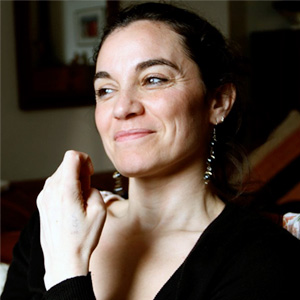Researcher, curator and Assistant Professor at the Open University of Catalonia and an Associate Lecturer at Central Saint Martins (University of the Arts London). She earned her PhD at the Universidad Complutense, Madrid (Spain). Her research interests are coloniality, curating, museology, modernity and its inventions of otherness, untranslatability and art in Latin America, with special attention to Brazilian art. Íñigo was co-founder of the independent research group Peninsula, procesos coloniales y prácticas artísticas y curatoriales, in collaboration with Museo Nacional Centro de Arte Reina Sofía. She has been a visiting fellow at the Afterall Research Center (2016–17), a researcher for the AHRC project Meeting Margins: Transnational Art in Europe & Latin America 1950-1978 (University of Essex and University of the Arts London), and a Postdoctoral Fellow at the University of São Paulo (FAPESP). She has written extensively for publications such as e-flux, Third Text, Afterall, Versión/sur, Revista de Occidente, Lugar Común, Stedelijk Museum Journal, Museum of Art of São Paulo, Frans Hals Museum/De Hallen Haarlem, Valiz, L’international European Frame project, and the Reina Sofía Museum, among others. Íñigo has been the editor-in-chief of issue #7 (2017) of the bilingual journal Re-visiones entitled: Is it possible to decolonize? The South as interlocution. This year she is co-editing the journal Art in Translation, edited by the University of Edinburgh (Taylor & Francis/Routledge), on Spanish visual culture and art during Francoism. In the last years she has presented her work in conferences as a guest speaker at Whitechapel Gallery (London), Nottingham Contemporary, MACBA (Barcelona), Reina Sofía Museum (Madrid), Glossary of Common Knowledge at European Frame project L ́International, DAAd Gallery (Berlin), Frame Contemporary Art Finland (Helsinki), Dutch Art Institute (Arnhem), Bauhaus Imaginista project (Rabat), e-flux lectures series, MA in Curating at the School of Visual Arts and ICI (New York), Brown University (Providence, USA) and Princeton University (USA), etc. She has curated exhibitions such as Tradition-translation in Rabat (2013), at the Jaqueline Martins Gallery (2013) in São Paulo (with artworks of the 1960s and 1970s by Bill Lundberg, Anna Bella Geiger & Leticia Parente), and in São Paulo at Simões de Assis Gallery on Niobe Xandó’s production in the 1960s and 1970s (2019).
Publications
Iñigo Calvo, Maria (ed.), “Spain coloniality and Francoism” in Art in Translatio, University of Edinburg, 2020.
Iñigo Calvo, Maria (ed), “It is possible to decolonized western methodologies?”, Revisione, Universidad Complutense de Madrid, 2017.
Iñigo Clavo, Maria, “Traces, Signs, and Symptoms of the unstranslatable”, E-flux online Journal, New York, 2020.
Iñigo Clavo, María, “Is Brazil a postcolonial country? On the Mestizo History Exhibition”, Paragrana, Wulf, Christoph Press Freie University of Berlin, 2016.
Iñigo Clavo M. (2019) “1969–2016: Lo popular en disputa
para el relato de la Guerra Fr.a en Brasil” en Paula Barreiro López (ed.), Atlántico frío. Historias transnacionales del arte y la política en los tiempos del telón de acero, Madrid, Brumaria, 2019, pp. 319-344.
Iñigo Clavo, Maria y Fernández López, Olga, “Transhistorical Curating and the Colonial (Dis)encounter” In The transhistorical museum: objects, narratives & temporalities, Fran Hals Museum / De Hallen Haarlem, 2018.
Iñigo Clavo, Maria, “The Museum of Popular Art, and the Attempt to Write and Art History with no Names”, Adriano Pedrosa e Instituto Cultural J. SAFRA (eds), MASP. Museu de Arte de São Paulo Assis Chateaubriand, São Paulo , Coleção museus brasileiros, Instituto Cultural J. SAFRA, 2017, pp. 35 – 45.

